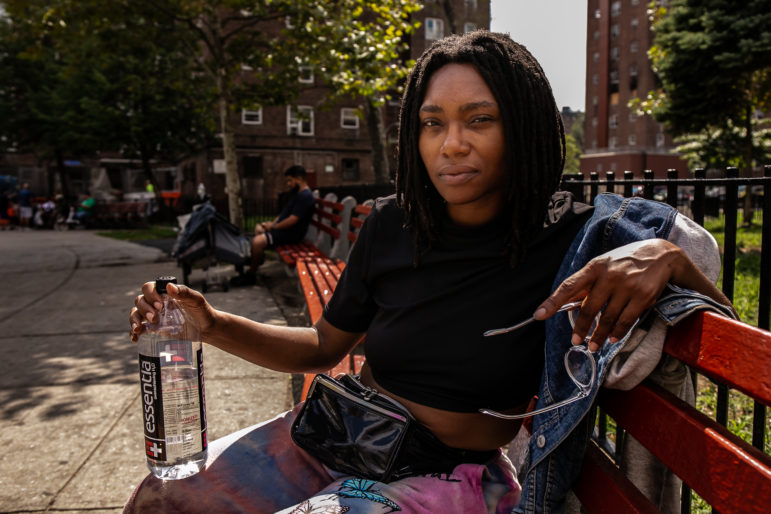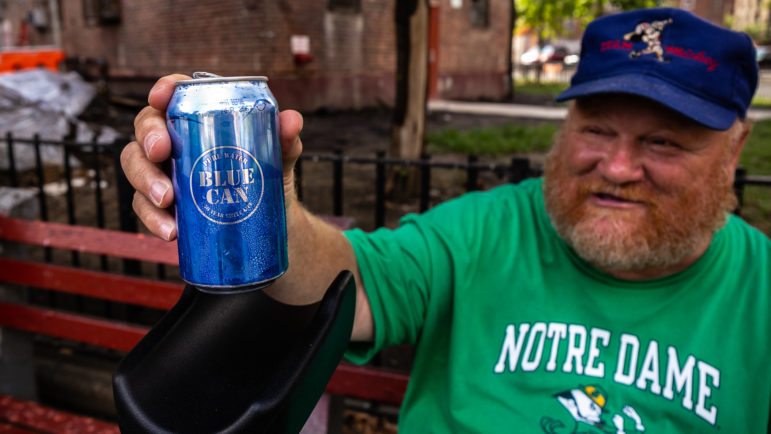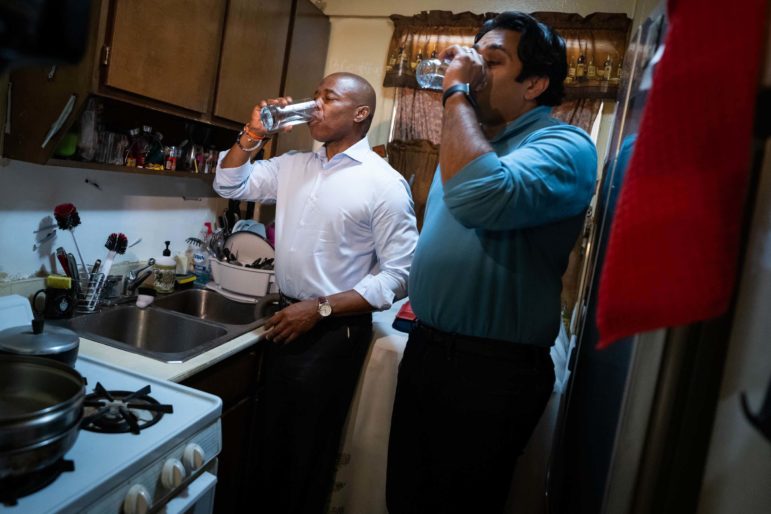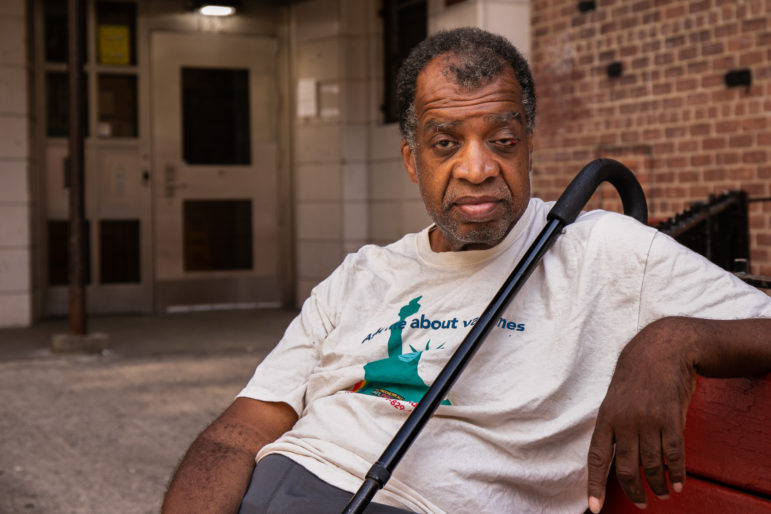For tenants who have spoken with City Limits in recent days, the impact of the tainted tap warning still lingers, invading their routines and spurring them to spend money on water they used to confidently get for free from the faucet.

Adi Talwar
Joy Howard, a resident of the Jacob Riis Houses, said she has been buying water and prepared food since NYCHA issued an alert about arsenic in the tap water. The agency has since said the water test that revealed traces of arsenic was the result of a lab error by the private company contracted to examine water samples.It’s been two weeks since Michelle Rodriguez last let her kids bathe inside their apartment at the Jacob Riis Houses in the East Village. They now walk to her grandmother’s apartment outside the complex for baths and showers, she said.
News of arsenic in the water has transformed the way the family lives, Rodriguez said, even after NYCHA and Mayor Eric Adams said the positive test was a false alarm resulting from a lab error by the private testing company, Environmental Management and Technologies (EMT). EMT issued a report Sept. 9 confirming the screw up.
Rodriguez, 33, said she and her family never bought bottled water in the past. But since the Sept. 2 arsenic warning, she isn’t taking any chances, she said. She made her point by mimicking the ads that law firms produce to reach members for class actions over asbestos, baby powder and other dangerous substances.
“A couple years from now, I don’t want to hear a TV commercial that’s like ‘Have you ever been exposed to this,” she said. “You never know.”
For tenants who have spoken with City Limits in recent days, the impact of the tainted water announcement still lingers, invading their psyches, disrupting their routines and lightening their wallets.
Rodriguez told City Limits that her family has spent around $400 on prepared food and packaged water since the Sept. 2 warning. She said she and her mother, who lives with her, have stopped cooking with the water from the tap.
“How do you really wash rice, cook beans, wash meat with bottled water?” she said
Related: Here’s How NYC Tenants Can Test Their Drinking Water
Fanta Mariam, 33, said she is using food stamps and cash to buy bottled water to cook and to wash her infant and 5-year-old. She said she was already hesitant to use the tap water for her children because it flows from the faucet cloudy and frothy. For the past two weeks, she has been buying a pair of gallon jugs each day.
“I’m not trusting it for a month at least,” Mariam said.
In the meantime, she will keep buying water at the Pioneer supermarket across the street, she said. The manager there Tuesday said the store has seen a noticeable uptick in water sales since the arsenic warning. Cases lined the wall behind the registers.

Adi Talwar
Mando Martinez, a lifelong resident of the Jacob Riis Houses, holds a can of water provided by the city after NYCHA warned tenants not to drink or cook with their tap water. He said he has a few cans left but will soon start buying bottles to make coffee, cook rice and drink.There are a lot of things to stress about in New York City. Water isn’t supposed to be one of them.
NYC H2O is the cleanest and most scrutinized supply in the state, at least until it hits individual plumbing systems, which may contain lead or other hazards (New York City offers free lead testing: Click here to get a free test kit sent to your home). Over the past two weeks, the water at the Riis Houses has been even more intensely monitored than most anywhere else.
Between Sept. 2, when NYCHA issued the arsenic warning—first reported by The City—through Sept. 9, NYCHA conducted 140 tests, with none showing traces of arsenic, a spokesperson for the mayor said. After EMT issued its mea culpa report, Adams stopped by the development Sept. 10 to chug a glass from the tap in one apartment.
“We can confidently say the water at Riis Houses is and has been free of any discernible amount of arsenic since the initial tests were initiated in August and meets EPA standards,” Adams said.
But that hasn’t eased the minds of many residents, who continue to buy water, often with food stamps and limited resources. Some tenants have filed a class action lawsuit against NYCHA to cover the costs and any future expenses.

Ed Reed/Mayoral Photography Office
Mayor Eric Adams (left) and Health Commissioner Dr. Ashwin Vasan drink water from a faucet at the Jacob Riis Houses on Sept. 10, 2022“This is public housing. Most of us don’t have a lot,” said Joy Howard, 33, a military veteran now studying at Kingsborough Community College. She estimated that she has spent more than $100 on prepared food she would have ordinarily cooked at home for her two children. She said she is on a fixed income and her food stamps don’t cover hot meals or delivery.
“Public assistance only pays so much,” Howard said. “I feel like I’m between a rock and a hard place.”
The city has not ruled out seeking compensation for Riis residents from EMT, the testing company.
In a statement Sept. 9, Adams’ spokesperson Fabien Levy said the city “intends to pursue all available legal options on behalf of the residents of Riis Houses.”
EMT did not respond to emails seeking comment about whether they would reimburse residents who have stopped drinking the water based on their bogus test. This story will be updated with their response.

Adi Talwar
An early afternoon view of NYCHA’s Jacob Riis Houses from Franklin D. Roosevelt East River Drive at East 10th Street on Sept. 13, 2022.The arsenic fiasco may have had another consequence: shortening the timeline for restructuring NYCHA leadership. CEO Gregory Russ stepped down from his position Thursday, leaving General Counsel Lisa Bova-Hiatt to serve as interim CEO. Russ will remain in his other post as chair overseeing the Preservation Trust, a contentious plan to change the source of funding for a portion of NYCHA’s 177,000 apartments.
Amid the shakeup, NYCHA does not seem to have any plans to reimburse people for the money they continue to spend on food and water since the arsenic alert. A NYCHA spokesperson said the agency “is reviewing all expenses for this emergency response to determine next steps.”
The spokesperson also highlighted the tons of water delivered to residents between Sept. 2 and 11. During that span, city workers distributed 380,000 bottles and cans totaling 46,000 gallons to residents living in the roughly 1,200 apartments that make up the sprawling complex, they said. The Department of Environmental Protection (DEP) also set up water stations at two sites around the complex.
That supply has nearly dried up.
Mando Martinez, a 64-year-old retired chauffeur, sipped from one of the last remaining cans he got from the city as he sat outside his apartment building Tuesday.
He said he has a single package of 24 cans left. At four cans per pot, it’s enough to make his coffee for the next six days. After a lifetime drinking the water at the Riis Houses, he said he plans to buy bottles to brush his teeth and cook his meals for the foreseeable future.
But that poses a new financial burden. Typical 24-packs of bottled water run anywhere from $3 to $8 depending on the store and brand.
“I’m on a fixed budget,” he said. “And now I have to budget for three or four cases of water a week?”

Adi Talwar
Lifelong Jacob Riis Houses resident David Brasuell said he was relieved when a blood test for arsenic revealed no trace of the toxin, but added that he was still hesitant to drink from the tap in his apartment.Around the corner, David Brasuell, 68, sat on a bench and said he hoped the city would provide some sort of reimbursement. He said he has spent about $100 on water since Sept. 2, even as he picked up bottles and cans distributed by the city.
Brasuell, a lifelong Riis Houses resident, said he got a blood test at his doctor’s office and was relieved when the results came back negative for arsenic.
So will he resume drinking from the tap?
“It’s too soon to tell,” he said.









One thought on “Arsenic Alarm Still A Drain on Riis Residents’ Routines and Resources ”
So why is the water coming out of the tap cloudy and frothy–as it has been for more than a month. It’s not arsenic, but what IS is?